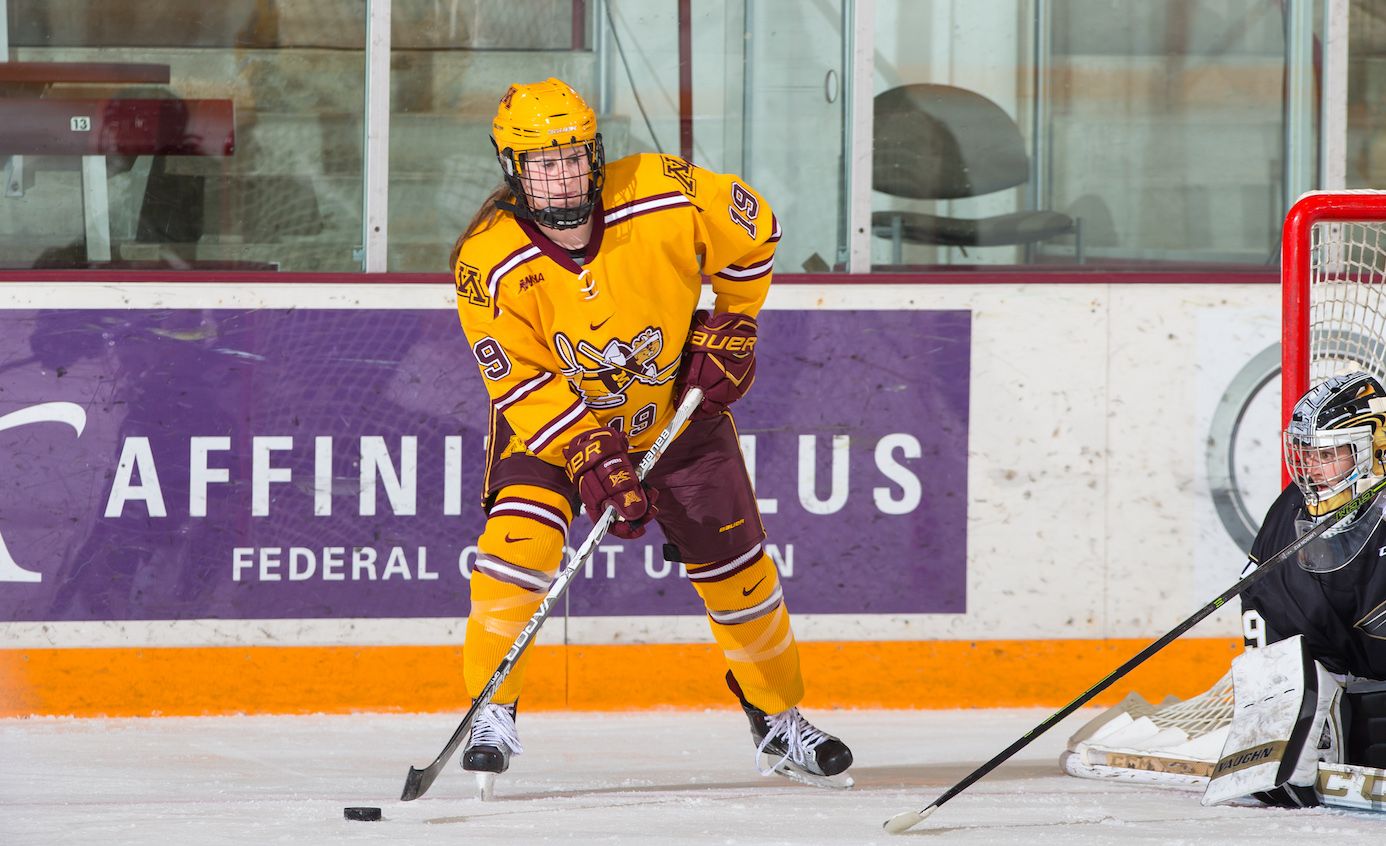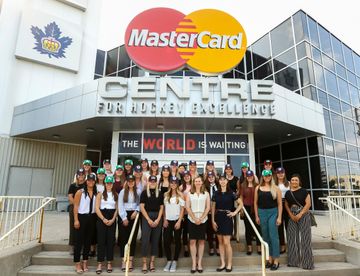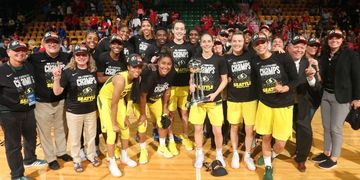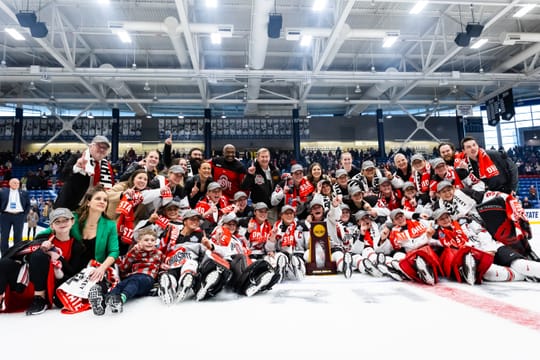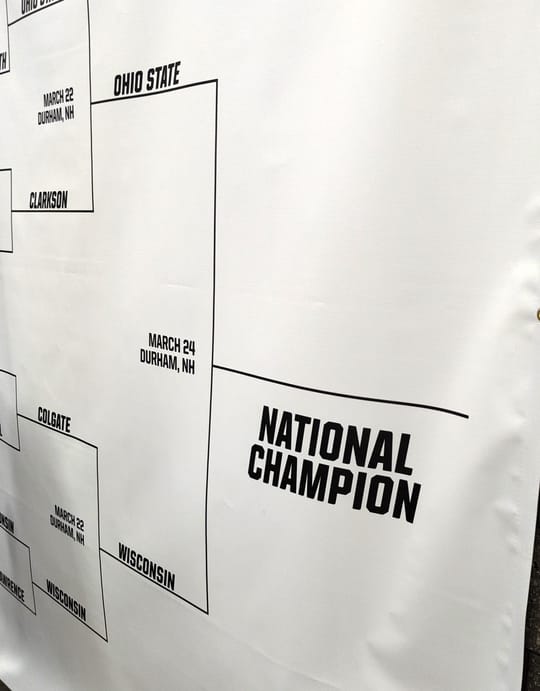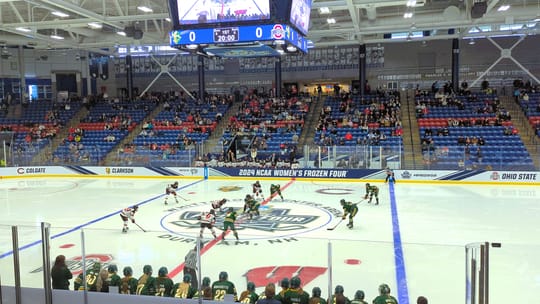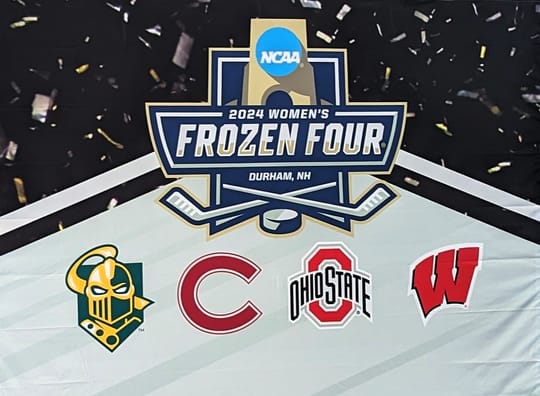In December 2016, Kelly Pannek had never been invited to a senior camp with USA Hockey. Fifteen months later, she won an Olympic gold medal. Her coaches at the University of Minnesota weren't planning on her missing the 2017-18 collegiate season. It wasn't that they didn't think she was skilled enough–it was just practically unheard of to have a player go from outside the pool of prospective players to Olympic roster in such a short time.
The timeline is actually even more compact than that. Though Pannek was invited to her first senior level camps–the December 2016 development camp–she was not put on the roster for the series between the US and Canada that took place that month. Her first senior level tournament was at the 2017 IIHF Women's World Championships, where Team USA won gold.
It all happened so fast that Pannek said she didn't really ever have time to freak out or get too far in her own head about it, though she said her family had a bit of a gut-check for her when they saw the speed of play at the World Championships, worrying if Kelly was prepared for what she was getting into. She didn't tally any points that tournament, but was had nine shots on goal. Less than a year later, she was winning Olympic gold.
The one thing every player will tell you about the transition from prep school to college or college to international play is that the game is always faster than you think it's going to be. Adjusting to the speed of the game is the most difficult thing every player has to deal with.
Pannek knew she was improving as a player during centralization when she not only felt comfortable with the speed of play, but she felt like she could control it.
Teammate Sarah Potomak said that it feels like the game slows down for Pannek. When she has the puck on her stick and enters the zone, no one is better at seeing how plays could develop and dishing the puck.
Partway through the 2016-17 season, Minnesota coach Brad Frost talked about the chemistry in his top line, which at the time consisted of Dani Cameranesi, Pannek, and Potomak. Pannek, he said, was the cerebral one. Pannek agrees. Never the fastest skater, she knew she had to make herself stand out in other ways.
Of all the things she learned on and off the ice during centralization, Pannek said her ability to see the ice and read her linemates are the parts of her game that are most improved. The thing is, that was probably already the best part of her game. Opponents should be more than a little scared to hear that Pannek has gotten even better in this part of her game.
"Her ability to see the ice and distribute the puck is her greatest gift," said Frost. "She slows the game down when she needs to, she speeds it up when she needs to."
Pannek led the NCAA in scoring during the 2016-17 season–undoubtedly one of the reasons she ended up on the radar for USA Hockey. She comes back to a college season that, according to Frost, looks to be one of the best ever played, with a pool of talent spread across several teams that should all vie for the national title.
The Gophers will be looking to Pannek to produce at those levels again and lead the team back to the Frozen Four. Minnesota were in danger of not receiving a bid to the post-season national tournament at all, but earned their conference auto-bid by beating Wisconsin to win the WCHA Tournament. They lost to rival Wisconsin in the NCAA quarterfinals, failing to reach the Frozen Four for the first time in seven years.
Outside of the actual game play, the most iconic moment to come out of the gold medal game in Pyeongchang might just be 20-year-old Maddie Rooney smiling, laughing and looking incredibly relaxed sitting on the boards of Team USA’s bench, waiting for the shoot-out to start.
For us watching at home, it was an unfathomable sight. We’d all been on the edge of our seats for two hours already. We'd watched the gold medal slip away four years ago. Surely the weight of the expectations of her teammates and the whole country were on her shoulders?
Not so, said Pannek. She remembers leaning forward and checking in on Rooney. Did she want to talk, did she not want to talk? And Pannek said Rooney responded like they were just two friends catching up, "Sure! What do you want to talk about!"
Thirteen of the 23 women on Team USA's roster were age 25 or younger and had never played in an Olympics before. Pannek said the young players managed to stay immune from the pressure and weight of expectations that may have plagued their teammates who had felt the gold slip away in Sochi four years earlier. They had a freedom, she said, that gave them no fear and left them feeling weightless.
The semi-final is a much more difficult game for Pannek. She can get in her own head and start worrying about not reaching her ultimate goal, about falling short. The pressure is in the semi-final.
By the time she's playing in a final, all that's melted away. Once you're in the final, she said, you take a deep breath and just play. That comes easy. That's what you know. All the weight is off. You're there and you have your shot. There's no more build up–it's just about going out on the ice and playing a game.
That’s how she felt in the gold-medal game in Pyeongchang. Pannek hit the post less than three minutes into the overtime period–an almost-goal that would have ended the game and secured the gold.
She said afterward she heard from some Gopher teammates who thought she'd be so angry with herself. They were shocked when the TV cameras showed her smiling and laughing it off.
The ability to shake those sorts of things off–to learn not to focus on the small things–is another big lesson Pannek learned during centralization. With so much time spent on the ice, if she was hard on herself over every mishandled puck or poorly aimed pass, she'd have been so far inside her own head she might have never recovered. Sharing time on lines with Team USA captain Meghan Duggan and then with Jocelyne and Monique Lamoureux gave her the opportunity to learn from veterans.
So instead of getting mad at herself for missing a possible gold-medal-winning goal, she just laughed and took a second to be amazed that she was even in a position to take that shot and almost win the game for Team USA. It was so surreal she couldn't possibly get upset.
It's rare that anyone ever gets the chance to truly start over in college hockey, but Pannek is close. After red-shirting last season, she's coming back to a Gopher squad that's nearly half underclassmen–teammates she's never played with before. She'll be a team leader, instead of being a newcomer like she was on Team USA. But Minnesota coach Brad Frost said Pannek takes on that role easily.
"I think she's a very natural leader. She had instant credibility because of the Olympic gold medal and just her leadership ability. When she talks, she just exudes confidence and leadership," he said.
Pannek said it'll be important to stay humble when coming back to the Gophers and find a balance between relearning the team and stepping it up as fifth-year senior. Luckily humility is something she said she's learned from the staff at Minnesota in her years there.
Every player that gets recruited to Minnesota is the best player on their current team. They've been the best player wherever they played. But only five players are on the ice at any given time. There's just one top line or defensive pair. It can be a difficult transition for freshmen, and creating chemistry on a team like that could be impossible. It's an intangible element to the game, but taking the best talent and getting them to be a team at an elite level is no easy task.
Pannek said there's mutual respect among all members of the Gophers team and support staff, and that experience prepared her for international tournaments. There is no ego allowed, she said. You just find your role and work to excel at it.
A lot changed for Pannek in the past year and a half, but she's still just 22 and there's something extra appealing about getting to go back and be a kid again, and play NCAA hockey for one more year. The centralization process that Pannek was thrown into with Team USA is understandably intense. There wasn't much time in any given day to devote to something other than hockey. On-ice practices bleed into off-ice workouts that are capped off by evening video sessions. Pannek said she really had to work to find ways to take time for herself and away from hockey to find a healthy balance.
It's one of the reasons she's most looking forward to returning to the Gophers. When she leaves Ridder, she gets to leave the game behind for awhile. Life as a student-athlete necessitates that there's more to life than hockey–which can make hockey all the more sweet to return to.
(Photo: Brad Rempel/Gopher Athletics)
